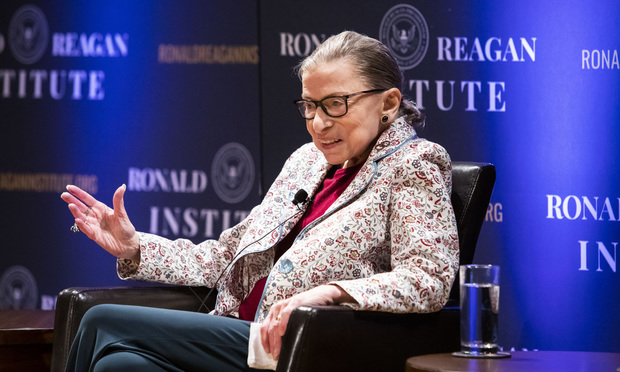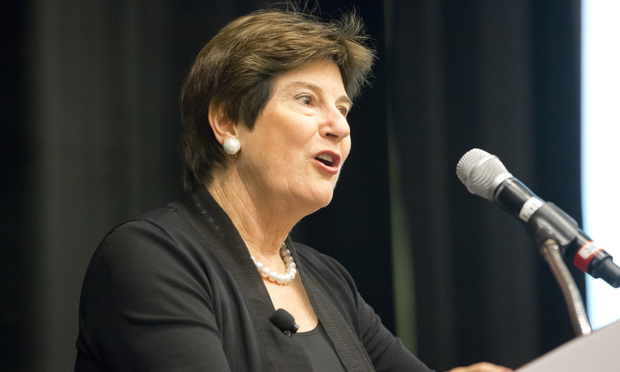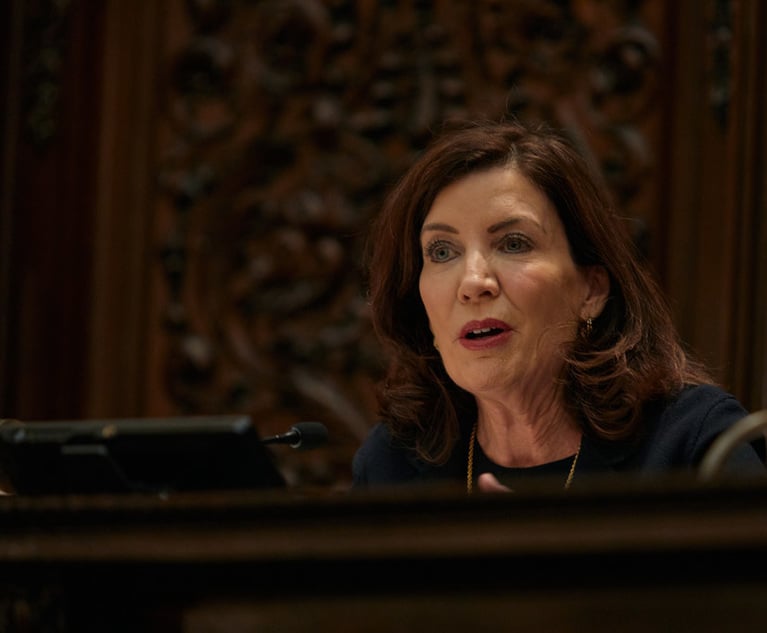Ginsburg Urges 'New Beginning' for Equal Rights Amendment
Virginia, Illinois and Nevada have gone to court to assert that the amendment, approved by Congress in 1972, has, in fact, been ratified.
February 11, 2020 at 10:17 AM
5 minute read
 Justice Ruth Bader Ginsburg speaking in September in Washington. Credit: Diego M. Radzinschi / ALM
Justice Ruth Bader Ginsburg speaking in September in Washington. Credit: Diego M. Radzinschi / ALM
The campaign to include the Equal Rights Amendment in the U.S. Constitution should "start over," Supreme Court Justice Ruth Bader Ginsburg said Monday.
"I would like to see a new beginning," Ginsburg said at an American Bar Association event celebrating the 100th anniversary of the 19th Amendment, which established that the right to vote could not be denied "on account of sex."
Ginsburg's statement could complicate the new effort to revive the ERA in the wake of Virginia's recent ratification of the amendment, the 38th state to do so. Virginia, Illinois and Nevada have gone to court to assert that the amendment, approved by Congress in 1972, has, in fact, been ratified, even though the Justice Department claims that the deadline for ratification has come and gone. Several other federal courts are also weighing the status of the amendment.
"There's too much controversy about latecomers [such as] Virginia long after the deadline passed," Ginsburg said at the event, which took place at Georgetown University Law Center. "Plus, a number of states have withdrawn their ratification. So if you count a latecomer on the plus side, how can you disregard states that said, 'We've changed our minds?'"
Ginsburg's long history and preeminence on the issue of women's rights and the ERA may make her viewpoint difficult to ignore as the revival effort continues. Her comments also quickly drew criticism for setting forth her opinion on the matter as litigation, which could reach the Supreme Court, is pending.
"There is little chance ERA supporters would file a motion to recuse Justice Ginsburg. Such a move would be an apostasy," constitutional scholar Josh Blackman wrote at The Volokh Conspiracy Monday night. "But I don't know how RBG could approach this case neutrally."
During the event Monday, Ginsburg insisted that the ERA is needed, even though protection for women's rights have been established in other ways.
"I've been asked many times, 'Well, haven't you, through the vehicle of the 14th Amendment's equal protection clause, gotten to about the same place where you would be with the ERA?' And my answer is, 'Not quite,'" Ginsburg said. "Every constitution in the world, written since the year 1950, even Afghanistan, has the equivalent of an equal rights amendment, and we don't."
She added, "It should be right up there with free speech, freedom of religion, and discrimination based on race or national origin. So I think, you know how the Constitution says, 'We the people, in order to form a more perfect union,' the union will be more perfect when that simple statement that men and women are persons of equal citizenship stature is part of our fundamental instrument of government. So even if the argument is it's largely symbolic, it is a very important symbol."
Ginsburg also seemed to acknowledge that achieving consensus on this and other issues may be difficult. "Yes, there are things that make us all worry, like a dysfunctional Congress, the parties so sharply divided," she said. "I am hopeful that there will be leaders on both sides of the aisle who will say it's time to get together and work for the good of the country. That is my hope and I would be content if I could see it happen in my lifetime."
 Judge M. Margaret McKeown, U.S. Court of Appeals for the Ninth Circuit. Credit: Jason Doiy/ ALM
Judge M. Margaret McKeown, U.S. Court of Appeals for the Ninth Circuit. Credit: Jason Doiy/ ALMGinsburg's comments came in a dialogue with Judge M. Margaret McKeown of the U.S. Court of Appeals for the Ninth Circuit, who chairs the association's commission celebrating the 19th Amendment's anniversary.
ABA President Judy Perry Martinez also spoke, warning that even though voting rights cannot be denied because of race or sex, "many voters still face ballot restrictions. New constructs evolved, some by misguided if not malignant design, to strip away the right to vote from otherwise eligible persons. Other challenges continue today, including accessibility to polling places for people with disabilities."
Read more:
Want to Be a Law Prof? Clerk for These Judges
Law Firms Are Failing Work-Life Balance, Ginsburg Says
Three States Sue to Add ERA to Constitution After Recent Ratification
Ginsburg and Gorsuch Clash Over 'Standing' in Religious School Choice Case
This content has been archived. It is available through our partners, LexisNexis® and Bloomberg Law.
To view this content, please continue to their sites.
Not a Lexis Subscriber?
Subscribe Now
Not a Bloomberg Law Subscriber?
Subscribe Now
NOT FOR REPRINT
© 2025 ALM Global, LLC, All Rights Reserved. Request academic re-use from www.copyright.com. All other uses, submit a request to [email protected]. For more information visit Asset & Logo Licensing.
You Might Like
View All
'Religious Discrimination'?: 4th Circuit Revives Challenge to Employer Vaccine Mandate
2 minute read
4th Circuit Revives Racial Harassment Lawsuit Against North Carolina School District
3 minute read
Reported Refusal to Officiate Gay Wedding Prompts Review by NY Judicial Misconduct Watchdog

Why ACLU's New Legal Director Says It's a 'Good Time to Take the Reins'
Trending Stories
Who Got The Work
J. Brugh Lower of Gibbons has entered an appearance for industrial equipment supplier Devco Corporation in a pending trademark infringement lawsuit. The suit, accusing the defendant of selling knock-off Graco products, was filed Dec. 18 in New Jersey District Court by Rivkin Radler on behalf of Graco Inc. and Graco Minnesota. The case, assigned to U.S. District Judge Zahid N. Quraishi, is 3:24-cv-11294, Graco Inc. et al v. Devco Corporation.
Who Got The Work
Rebecca Maller-Stein and Kent A. Yalowitz of Arnold & Porter Kaye Scholer have entered their appearances for Hanaco Venture Capital and its executives, Lior Prosor and David Frankel, in a pending securities lawsuit. The action, filed on Dec. 24 in New York Southern District Court by Zell, Aron & Co. on behalf of Goldeneye Advisors, accuses the defendants of negligently and fraudulently managing the plaintiff's $1 million investment. The case, assigned to U.S. District Judge Vernon S. Broderick, is 1:24-cv-09918, Goldeneye Advisors, LLC v. Hanaco Venture Capital, Ltd. et al.
Who Got The Work
Attorneys from A&O Shearman has stepped in as defense counsel for Toronto-Dominion Bank and other defendants in a pending securities class action. The suit, filed Dec. 11 in New York Southern District Court by Bleichmar Fonti & Auld, accuses the defendants of concealing the bank's 'pervasive' deficiencies in regards to its compliance with the Bank Secrecy Act and the quality of its anti-money laundering controls. The case, assigned to U.S. District Judge Arun Subramanian, is 1:24-cv-09445, Gonzalez v. The Toronto-Dominion Bank et al.
Who Got The Work
Crown Castle International, a Pennsylvania company providing shared communications infrastructure, has turned to Luke D. Wolf of Gordon Rees Scully Mansukhani to fend off a pending breach-of-contract lawsuit. The court action, filed Nov. 25 in Michigan Eastern District Court by Hooper Hathaway PC on behalf of The Town Residences LLC, accuses Crown Castle of failing to transfer approximately $30,000 in utility payments from T-Mobile in breach of a roof-top lease and assignment agreement. The case, assigned to U.S. District Judge Susan K. Declercq, is 2:24-cv-13131, The Town Residences LLC v. T-Mobile US, Inc. et al.
Who Got The Work
Wilfred P. Coronato and Daniel M. Schwartz of McCarter & English have stepped in as defense counsel to Electrolux Home Products Inc. in a pending product liability lawsuit. The court action, filed Nov. 26 in New York Eastern District Court by Poulos Lopiccolo PC and Nagel Rice LLP on behalf of David Stern, alleges that the defendant's refrigerators’ drawers and shelving repeatedly break and fall apart within months after purchase. The case, assigned to U.S. District Judge Joan M. Azrack, is 2:24-cv-08204, Stern v. Electrolux Home Products, Inc.
Featured Firms
Law Offices of Gary Martin Hays & Associates, P.C.
(470) 294-1674
Law Offices of Mark E. Salomone
(857) 444-6468
Smith & Hassler
(713) 739-1250










